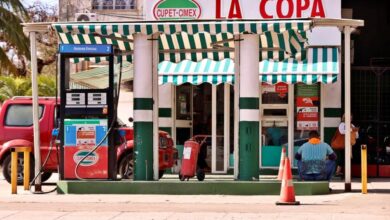Does Rosario Murillo hold the power in Nicaragua?
 How has the eccentric Nicaraguan vice president influenced the politics of her country?
How has the eccentric Nicaraguan vice president influenced the politics of her country?

The last days in Nicaragua have been the most violent in recent years. On account of a pension reform that the government of President Daniel Ortega wanted to promote, thousands of Nicaraguans took to the streets to rally against the measure, which sought to reduce the pensions of pensioners by 5% and increase the contribution of taxpayers.
Leer en español: ¿Está Rosario Murillo detrás del poder en Nicaragua?
The government remained silent during the first days of the demonstration until the vice president, Rosario Murillo, appeared publicly to give the official version of the events. During five days of protests, fiercely suppressed by the military forces, 90 civilians were wounded and 30 were killed. The situation could not be worse. There were even calls for other countries and Pope Francis for calm. The pressure was so great that President Ortega announced that he would cancel the measure, hoping that the protests would subside; this did not happen.
What is happening in Nicaragua transcends the pension reform and there are clamor for the resignation of Ortega and his wife, Vice President Rosario Murillo. Although the history of the former guerrilla, who participated in the overthrow of the Somoza dictatorship in 1979 and now commanded by the Central American country, is well known, his partner is a less showy figure, but no less influential.
Who is Rosario Murillo?
Murillo, Nicaraguan by birth and niece of the revolutionary Augusto César Sandino, grew up in a wealthy family that allowed him to study languages abroad. In 1967 she became a language teacher in Managua. Two years later he joined the insurgent movement Sandinista Front of National Liberation (FSLN), from where he denounced the dictatorship through his poetry.
Murillo met Ortega in 1978, when he lived in Costa Rica during his self-exile. The revolution was at its height and the following year, the dictator of Nicaragua, Anastasio Somoza Debayle, left his country while the FSLN forces entered Managua. Between 1979 and 1985, Ortega was a member of the National Reconstruction Board. That same year, he became president of the country.
While Ortega sought funds and credibility in the revolution abroad and led Nicaragua, Murillo accompanied him at all times. She worked since 1981 in Ventana, the cultural supplement of the FSLN newspaper. During the first presidential term of her husband (1985-1990) she strongly influenced his government's program, making culture one of the priorities. In 1984 she was deputy to the National Assembly, a position she held until 1990, when she also ended her term as director of the country's Institute of Culture. There she contributed enormously to the promotion of Nicaraguan artists.
In 2005 she married Ortega, and the following year he achieved his second presidential term. From that point forward, Murillo has gained prominence in the government, so much so that as of January 2017, she holds the vice presidency of Nicaragua. Gradually, it has become the visible face of the government, as when it went to the country against the official version of the events on April 19.
She was responsible for the redesign of the official images of her country, obeying the eccentric style that characterizes her, as well as the installation of the controversial "trees of life", whose function is mainly symbolic and which are also object of protest in the last days.
Of the most controversial disputes in which she was involved is the case of alleged violation of her daughter Zoilamérica Narváez by her husband, this in 1998. Narváez reported that she had been abused by her stepfather since she was 11 years old, but the complaints were dismissed for the immunity that Ortega enjoyed for having been president. Murillo publicly acknowledged, on several occasions, that she "felt ashamed" of her first-born for wanting to harm the name of Ortega.
The role of Murillo in her country is problematic, since thanks to the influence of her husband, she has been able to occupy a multiplicity of important positions in the country, which reflects nepotic tendencies in the government of Nicaragua. This, added to the clinging to power that the couple professes, can only result in a greater social imbalance than that seen in recent days in the Central American country.
LatinAmerican Post | Iván Parada Hernández
Translated from "¿Está Rosario Murillo detrás del poder en Nicaragua?"

 How has the eccentric Nicaraguan vice president influenced the politics of her country?
How has the eccentric Nicaraguan vice president influenced the politics of her country?



